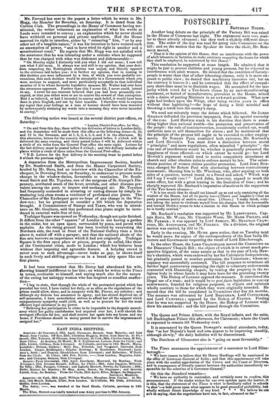POSTSCRIPT.
SATURDAY NIGHT, Another long debate on the principle of the Factory Bill was raised in the House of Commons last night. The arguments were very simi- lar to those already advanced ; but they took a slightly different direc- tion. The order of the day was read for going into Committee on the bill ; and on the motion that the Speaker do leave the chair, Mr. ROE- BUCK moved, " That it is the opinion of this House, that no interference with the power of adult labourers in factories, to make contracts respecting the hours for which they shall he employed, be sanctioned by this House," This resolution he supported at some length. He admitted that it might be just to protect children and young persons, but he objected to interference with adult women. He denied that the condition of factory- people is worse than that of other labouring-classes, only it is more ex- posed to public view ; he denied that machinery increases toil, but on the contrary it lessens it ; and he contended that the effect of compul- sory short-time must be to diminish wages. Ile accounted for the ma- jority which voted for a Ten-hours clause by an anti-manufacturing sentiment, or hatred of manufacturers, prevalent in the House, mixed with a desire of putting Ministers in an awkward position. What new light had broken upon the Whigs, after being twelve years in office without thus legislating ?—the hope of doing a little mischief and throwing a torch into the enemy's camp.
We need not minutely trace the debate which followed. Sir JAMES GRAHAM defended the provision impugned, from the special necessity of the case. Lord HowicE. stuck to his doctrine that there is some- thing higher than national wealth—the protection and preservation of the people : the rule of nonintervention, consistently carried out, would authorize men to sell themselves fur slaves ; and he maintained that the principle of the present bill ought to be extended to other employ- ments. Sir ROBERT PEEL combated both extremes, Mr. Roebuck's and Lord Howick's. You must draw a distinction between moral " principles" and mere regulations, often miscalled " principles" : the true test of interference would be, whether it practically promoted the happiness of those affected—to which extent he would go : but Lord Howick's argument would tend to revive compulsory attendance at church and other obsolete rules to enforce morals by law. The subor- dinate position of women claims peculiar protection. Lord JOHN RUS- SELL charged Sir Robert Peel with alternating between contradictory statements ; likening him to Mr. Windham, who, after arguing on both sides of a question, turned round to a friend and asked, " Which way did I say I would vote ? " Lord John, however, argued to much the same effect, but with a great leaning to the limitation of time ; and he sharply reproved Mr. Roebuck's imputation of motives in the supporters of the Ten-hours clauses- " It is too much that he should set himself up as not only containing all the wisdom of the House, but all its purity too—(Cheers and laughter)—that no party possesses purity of motive except him. (Cheers.) I really think, with- out taking the pains to vindicate myself from his charges, that the honourable and learned Member seems to take a station in this House to which perhaps he is hardly entitled."
Mr. Roebuck's resolution was supported by Mr. LABOUCHERE, Cap- tain Rous, Mr. WARD, Mr. CHARLES WOOD, Mr. MARK PHILIPS, and Mr. PARKER ; it was opposed by Lord ASHLEY., Mr. SHARMAN CRAW- FORD, Mr. AINSWORTH, and Mr. FIELDER. On a division, the original motion was carried, by 282 to 76.
Early in the evening, Mr. HUME gave notice, that on Tuesday next he would move for copies of the correspondence of the East India Di- rectors and Government respecting the recall of Lord Ellenborough.
In the other House, the LORD CHANCELLOR moved the Committee on the Dissenters' Chapels Bill ; the object of which is to arrest much pro- spective litigation, of the same nature as that in the case of Lady Hew- ley's charities, which were endowed by her for Calvinistic Independents, but gradually passed to another persuasion, the Unitarians ; whose oc- cupancy was successfully contested. The bill proposes to terminate all further legal controversy respecting the right to voluntary endowments connected with Dissenting chapels, by vesting the property in the re- ligious body in whose hands it may have been for the preceding twenty years. The Bishop of LONDON opposed the measure. It sanctioned the illegal use of a trust ; and it would be er post facto legislation to con fey endowments, founded for religious purposes, to objects and opinions wholly contrary to those for which they were originally intended. He moved that the bill be considered in Committee that day six months. The measure was advocated by Lord I3norcHAm, Lord COTTENHAM, and Lord CAMPBELL ; opposed by the Bishop of EXETER. Finding that he was not supported by the House, the Bishop of LONDON with- drew his amendment : and the bill passed through the Committee.


























 Previous page
Previous page